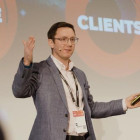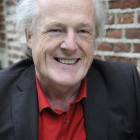Pre-Conference Workshops
Develop Practical Skills and Acquire a Deeper Knowledge
Book your place in advance as seats are limited!
You can register for a workshop with a free exhibition ticket here.
If you are registered for the main conference already, you can add workshops on your ticket portal.
If you need to register for the main conference as well, please follow this link.
FD1 Full-day Event
Date Wednesday, 3 Dec Time – Room: Schöneberg Price: free of charge Status: fully booked
FD1 - EdHack: A Participatory Design Sprint for Advancing Educator AI Literacy
Workshop leaders

Dan Be Kim
AI Fellow, Harvard Graduate School of Education
Dan Be Kim is a startup founder turned educational technologist focused on reimagining teaching and learning in the age of AI. A startup enthusiast with an extensive background in product management, she has conceptualized and launched several marketplaces, including a venture-backed PropTech startup in the Bay Area. After arriving at Harvard determined to build evidence-based, AI-powered tools for education, she quickly discovered how overwhelmed and under-supported many educators and learners felt when engaging with this rapidly advancing technology.
Today, Dan Be’s work explores how AI can truly enhance and augment — not replace — human intelligence. Through PromptED, she helps educators and learners develop the intuition, fluency, confidence, and critical judgment needed to collaborate with AI in thoughtful, creative, and human-centered ways.
She currently contributes to research on Inspiring Moral AI Guidance in Education (IMAGINE) at the Harvard Center for Digital Thriving. In her role as an AI Fellow at the Harvard Graduate School of Education, she is helping to onboard ~700 incoming students by equipping them with the skills needed to leverage AI responsibly in their academic work and professional pursuits. As a Learning Design Fellow, she co-designed an AI literacy tutorial for all incoming students, a mandatory requirement before starting any coursework. The module introduces what responsible and effective AI use looks like in higher education, explores the nuance between school-wide and course-specific AI policies, and features diverse faculty perspectives to highlight how expectations vary across disciplines.
As an educational technologist, she is an active member of both the UNESCO Global Science of Learning Alliance and the Global Science of Learning Education Network (GSoLEN) hosted at UC San Diego, where she advocates for the conscious design of educational technologies grounded in evidence-based Science of Learning principles.
EdHack is a hands-on design sprint where educators, researchers, technologists, and learning scientists come together to prototype AI-powered learning tools that address real-world classroom challenges. This OEB edition builds on the inaugural Ed<>Hack hosted at the MIT Media Lab, co-organised by the SundAI Club (an AI hackers community incubated at MIT and Harvard) and the AI Literacy Club at the Harvard Graduate School of Education. That event brought learning scientists and classroom educators together with AI technologists and tinkerers to conceptualise and prototype EdTech solutions rooted in the learning sciences and shaped by real needs.
In this full-day session, participants will explore functional AI literacy through interdisciplinary collaboration and hands-on immersion in the application layer of generative AI. They will learn how to use a range of AI tools to enhance existing workflows, build custom tools, and do so in ways that are highly domain-specific and relevant to their professional roles—whether as faculty rethinking assessment, administrators automating certain workflows, or EdTech entrepreneurs prototyping new ideas.
The EdHackathon is free of charge, but participation requires prior registration for the main conference as well as a separate workshop registration with a Letter of Intent sent to info@oeb.global
Agenda:
• Welcome, agenda overview, and group formation (15 minutes)
• Opening Talk: A Multidimensional Look at AI Literacy (45 minutes)
• Coffee Break (15 minutes)
• Live Tool Demos (30 minutes)
• Introducing the Grand Challenge (15 minutes)
• Lunch Break (60 minutes)
• Team-Based Prototyping (120 minutes)
• Showcase Preparation (30 minutes)
• Grand Challenge Showcase (60 minutes)
• Closing Circle, Reflections and Key Takeaways (30 minutes)
Target Audience:
Educators, learning designers, technologists, EdTech professionals, curriculum developers, instructional coaches, education leaders, learning scientists
Target Audience Sector:
Higher education, workplace learning, upper-secondary education, EdTech sector
Prerequisite Knowledge:
Familiarity with educational contexts; no technical expertise required. Curiosity about AI and openness to creative experimentation encouraged.
Outcomes:
• Gain practical experience with functional AI literacy
• Prototype a tangible learning artefact using AI
• Experience the human-AI collaboration process firsthand
• Move from blind adoption to intentional curation and creation
FD2 Full-day Event
Date Wednesday, 3 Dec Time – Room: Charlottenburg I Price: free of charge Status: fully booked
FD2 - Distance Learning in Europe - Exchange of Experience and Knowledge Sharing

John Trasler
President, European Association for Distance Learning (EADL)
Passionate about developing people John has experience of working as Managing Director for global companies as well as the non profit sector. He is the co founder of Elearn a UK blended learning training company specialising in Leadership, Management and Coaching.
Currently working on a number of coaching assignments and senior level leadership development programmes John specialises in blended and distance learning approaches using a mix of media.
He is President of the European Association for Distance Learning and has research interests in using technology to innovate and support learning.

Andreas Vollmer
President, Federal Association of Distance Learning Providers
Andreas is member of the presidium of Bundesverband Fernstudienanbieter eV Berlin. With more than 100 experts for media-supported and tutored learning, we are now the leading specialist association for digital (further) education including tutoring in German-speaking countries. Through our scientific and educational policy campaigns, we stimulate public discussion and strengthen the acceptance of digital, quality-assured learning methods. We provide impetus for innovative learning concepts that meet the requirements of today's society, the labor market and the demands of learning adults.
Media-supported and tutored learning is the unifying element of our members - they are all experienced experts in life- and work-related forms of learning. Thanks to our modern association structure, we are a powerful action platform with great design options for our members.
Andreas also Managing Director of Klett Corporate Education Services, part of the Stuttgart based Klett Group. He focuses on adult education and cooperation with employment agencies and job centers in the education voucher business.

Oliver Nahm
Scientific Officer, Federal Institute for Vocational Education and Training (BIBB)
Oliver Nahm leads the project “Learning Analytics – Distance Learning” at the Federal Institute for Vocational Education and Training (BIBB), which aims to assess the importance of Learning Analytics for vocational distance learning courses, as well as further its implementation.
He has worked as a teacher and trainer for many years, designing and teaching courses both on- and offline. His focus is on a holistic and flexible approach to education, utilizing data, while keeping the focus on the human element.

Ellen Gunning
Chief Executive Officer, Mettacomms
Ellen Gunning created Irish Academy of Public Relations in 1992. The college provides internationally recognised online professional diploma courses, modular self-learning CPD courses and corporate training in communications disciplines. Ellen is author of three books, including the global third-level core text “Public Relations – A Practical Approach”. She specialises in Crisis PR training and consultancy. Her other business, Mettacomms, is an AI powered platform offering sight of future trends in multiple disciplines. A member of the board of EADL, the European Association for Distance Learning, Ellen’s panel contribution spans both communications and future-vision inputs.

Andrea Feddersen
Head Manager, Apollon Academy
Andrea Feddersen is Head of the APOLLON Akademie in Bremen, a distance learning institute focused on professional development in health and social sectors. With a career dedicated to e-learning and digital education, she emphasizes enhancing learners' experiences through advanced media solutions and online learning environments. Currently, she is exploring the integration of artificial intelligence into the learning process, particularly in relation to exams and assessments. Her current approach aims to optimize educational outcomes, supporting students throughout their learning journey.

Kari Olstad
Senior Advisor, Flexible Education Norway
Ms Olstad has over 25 years of experience in education and technology. In the organisation Flexible Education Norway, she is responsible for the committee on quality in flexible education, and advises on innovation and digital learning design. She has contributed to several international projects, and promotes openness and sharing in flexible and distance education.

John Kilroy
Founder & CPO, Digital Learning Institute
John is founder of the Digital Learning Institute (DLI). DLI are the global
leaders in digital learning education and certification with a mission to
elevate the standards of digital learning across education and work-based learning. John is a leading digital learning specialist globally with over 25 years of experience supporting organizations with their digital learning strategy and policy. John has worked with some of worlds leading education institute and school to help them advance their digital learning capability and strategy.

Jens Greefe
Director of Studies, Klett Online Continuing Education Ltd. & Co. KG
Jens Greefe is the Director of Studies at Klett OWB, Klett Online Weiterbildung GmbH & Co. KG in Hamburg. Klett OWB, together with its subsidiaries ILS, SGD, Fernakademie für Erwachsenenbildung, and Schule des Schreibens, teaches approximately 90,000 participants annually in more than 300 distance learning courses. He holds a diploma in Economics and is responsible for the development, organization, and quality management of the course programs.
From 2012 to 2020, Jens Greefe served as Vice President, and from 2022 to 2025 he was a member of the board of the German Association for Distance Learning (“Bundesverband der Fernstudienanbieter,” formerly “Forum Distance Learning”).
Since 2021, he has been a member of the Global Advisory Board of OEB Online Educa Berlin.
Jens Greefe has chaired the Research & Development Committee since 2014 and has been a member of the board of EADL since 2025.

Niels Henrik Helms
President, FLUID – the Danish Network for Flexible Learning in Education and Training
Niels Henrik Helms is President of FLUID – the Danish Network for Flexible Learning in Education and Training. He has previously served among others as Associate Professor at the University of Southern Denmark (SDU) and docent at University College Copenhagen (KP).
His research and development work focuses on flexible and distance learning, exploring how digital and hybrid formats transform education and professional practice. A central theme in his work is the role of materiality in learning — how tools, spaces, and technologies shape human understanding and interaction.
Helms combines academic inquiry with practical innovation across education, art, and technology, emphasizing creativity, embodiment, and the social dimensions of learning.
Distance learning providers today are processing large amounts of participant data to optimise their services and provide the best possible support to their learners. The role of using AI is becoming increasingly important in many ways. Therefore, distance learning providers need to have solid prompting skills.
Another important question is how AI tools can speed up the development of course programmes and help create high-quality content in less time. Certain innovative course programmes will showcase contemporary trends in course development.
Agenda:
10:00 – Assessing and Furthering the Role of Learning Analytics in Vocational Distance Learning with special reference to selected AI tools
- Introduction and Results
- Group Work and Sharing Results
Dr. Oliver Nahm, BIBB, Germany
13:00 – Lunch Break (at own arrangement)
14:00 – Afternoon Sessions
- The Great Shift: How Technology and Society Are Rewriting Educatio
Ellen Gunning, Mettacomms, Ireland
- The Nordic Project – Experiences in Online Course Programs in Scandinavia
Kari Olstad, FuN, Norway
Niels Henrik Helms, FLUID, Denmark
- The Challenge of Learner Assessment and AI
Andrea Feddersen, Apollon Academy, Germany
Anett Fürstenberg, Klett Online Weiterbildung GmbH & Co. KG, Germany
- Using AI Innovatively in Course Programs
Eva Kilar and John Kilroy, Digital Learning Institute, Ireland
17:00 – End of Workshop
Target Audience:
Distance learning providers, adult learning professionals, VET specialists, researchers, HR managers
Target Audience Sector:
Vocational education, higher education, research, policy
Prerequisite Knowledge:
–
Outcomes:
• Gain knowledge about prompting methods
• Receive insights into AI tools for content creation and course development
• Share knowledge about new trends and innovative course programmes
• Expand networks and support knowledge sharing in distance education
FD3 Full-day Event
Date Wednesday, 3 Dec Time – Room: Pavillon Price: free of charge Status: places available
FD3 - Speexx Exchange

Amy Brann
Associate, Moller Institute
Amy has been named a 2025 HR Most Influential Thinker and is the founder of Synaptic Potential, a consultancy that supports sustainable high performance enabling people to contribute more to their organisation by working smarter not harder. She is an author and a global speaker who’s ‘Fact not Fluff’ approach is a welcome authority in a world awash with questionable theories. She passionately believes that a great way to achieve your full potential in life and work is by knowing more about how your brain works so you can work with it. Her combination of scientific expertise and practical real-world experience give audiences easy-to-implement frameworks that uplift brain performance.

Lori Niles-Hofmann
EdTech & AI Strategist, 8Levers
Lori is a senior learning strategist with over 20 years of L&D experience across many industries, including international banking, management consulting, and marketing. She specialises in large-scale digital learning transformations and is passionate about helping companies navigate through the ambiguity of change.
After leading and completing numerous EdTech implementations, Lori has developed data-based methodologies and frameworks to empower L&D teams to move from business support function to strategic business driver.
Lori serves on several EdTech and HRTech boards and has published two courses on LinkedIn Learning with 100K completions. She is also the author of the recently released book "The Eight Levers of EdTech Transformation".
Links

Jo Cook
Director, Lightbulb Moment
Jo Cook is Director of her company Lightbulb Moment, which specialises in developing, facilitating and training others to deliver great live online training sessions, virtual classrooms, webinars and blended, digital programmes. Jo has a background in teaching, technology and journalism. She facilitates, speaks, writes, blogs and tweets on L&D topics and part-time is the Deputy Editor of Training Journal magazine and website. Jo’s background includes further and higher education, the charity sector, small and large organisations, including CNN News and Bupa International.

Laura Granel Mene
Learning & Development Manager Southern Europe, CINESA
Laura Granel is a passionate professional dedicated to talent development and organizational culture. From the Culture & Development area at Cinesa & UCI, she leads projects that strengthen leadership, continuous learning, and recognition, helping people and teams grow and connect with purpose.
She firmly believes in the power of learning as a driver of transformation, and in leadership as an opportunity to inspire, innovate, and create a positive impact. Her style blends warmth, clarity, and creativity—three values she brings to every workshop, conversation, and experience she designs.

Johannes Wendt
Learning Consultant / AI Officer, TTS
Johannes Wendt is a Learning Consultant and AI Officer at tts, specializing in the intersection of adult education, media didactics, and corporate learning. With a master’s degree in Adult and Further Education from the University of Duisburg-Essen, his work focuses on integrating technology, design, and storytelling into effective learning experiences.
He is particularly interested in playful approaches to exploring new tools and methods, with a current emphasis on the educational applications of generative AI. His perspective is shaped by science communication and contemporary social and political developments.

Genc Begolli
HR IT & Digital Transformation Leader | Expert in Learning, Culture & Cybersecurity , AUDI
Genc Begolli is an experienced project and transformation leader with more than 15 years of expertise at the intersection of HR, IT, and digital innovation. In his current role at Audi, he drives innovative HR IT strategies and digital solutions in the areas of apprenticeship, culture development, leadership, and learning.
Previously, he led international projects in the financial and automotive sectors, focusing on IT architecture, cybersecurity, and transformation. With his background, he combines technology, security, and people topics to inspire sustainable digital workplaces.

Clare Walker
Coaching and Mentoring Lead , Vodafone
Clare Walker is the Coaching and Mentoring Lead at Vodafone, where she oversees a community of 130 professionally certified coaches, engagements for senior and executive leaders with Ezra and facilitates upskilling workshops that are available to the 80,000 global employees. Clare holds credentials with ICF and EMCC as a Professional Coach and Supervisor, as well as being a TypeCoach and Hogan practitioner. Last year she worked in Kenya with 12 peers to create a Master Certified Coach programme. Living in the Lake District in the north of the UK, Clare has regular opportunities to enjoy the beautiful outdoors with her family.

Giovanni Giamminola
AI Advisor for Business Transformation, Author of the book "The Augmented Manager"
Giovanni Giamminola is an Artificial Intelligence Advisor for Business Transformation with over twenty years of experience as CEO and General Manager across Europe and North America, leading companies with revenues exceeding one billion euros. He holds a degree in Economics from Università Cattolica in Milan and executive education from Harvard Business School. Adjunct Professor at UCL and member of the Steering Committee of the Executive Master “AI-Driven Business Models” at Università Cattolica, he authored the bestsellers Il Manager Potenziato and Il Brand Potenziato. He created the “Manager Potenziato Method,” combining strategic and agentic AI to accelerate organizational transformation

James Swift
Director of Talent Development, Leyton UK
James Swift is Director of Talent Development at Leyton, a global consultancy firm accredited as an exceptional learning organization. Twice a finalist for Learning Leader of year, he leads the strategy that creates an environment that empowers performance across all levels of the organization. James is passionate about AI, skills, and data, and has been published as a leading case study for his work with AI. He is a proponent of using AI to support human capability, and has created the "swift Model" of organizational performance.

Armin Hopp
Founder , Speexx
Armin Hopp is co-founder and president of Speexx, the world’s leading digital language skills testing and learning platform. He is also president of the International Council on Badges and Credentials (ICoBC) He´s passionate about family, digital learning, EdTech, HR tech, learning transformation, guitars – and Speexx.
Empowering People in large organizations worldwide through Speexx Coaching™, digital language training, and skills assessment for all team members.
Links

Laura Overton
Analyst - Explorer - Writer - Facilitator, Learning Changemakers
I am an experienced international speaker, author and facilitator with a passion for exploring, challenging and sharing. I believe that the role of learning leaders in the changing workplace is to unlock the potential of business and people. My goal has always been to help learning leaders ensure that their organisations are equipped and ready through outcome-led and evidence informed practice.
Together we will co-create the future of learning - one where learning leaders will become business critical as they uncover new ways to add value. As the founder of Towards Maturity- I led a global research programme for 15 years, bringing a community of practitioners, policy makers, experts and suppliers together to investigate how learning innovation delivers business value.
I continue to investigate, to explore , to communicate insights and facilitate collaborative change in the industry through workshops, coaching and sounding board work via #LearningChangemakers and as co-founder of Emerging Stronger.
Tracking the L&D learning innovation journey since 2003, I have authored/ co-authored of over 70 major research reports and, as a regular contributor to industry publications I have written over 300 articles. I continue to play an active role in research working with the CIPD and other significant industry bodies.
As an industry change maker, I regularly share good practice findings as a keynote presenter at conferences around the globe and through masterclasses, webinars and seminars. I have served on several advisory boards including the original LPI Capability Map, the CIPD Professional Map and Learning boards, the Online Educa Global Council and the original Distributed Electronic Learning Group for the UK government.
I am an academic fellow of the CIPD, a fellow of the RSA and the first female recipient of the Learning and Performance Institute’s Colin Corder Award for outstanding achievement. I was also the first recipient of the Learning Technology award for outstanding achievement and regularly appear in the top influencer lists for our industry.
I am always willing to work with LearningChangemakers across the industry so please contact me if you would like to find out more about my writing, facilitation, coaching or soundingboard work.
Links

Donald H TAYLOR
Chair, Learning Technologies London
Donald H Taylor has worked in learning and technology since the mid-1980s.
He has chaired the Learning Technologies Conference in London since 2000 and writes and speaks world-wide. His annual L&D Global Sentiment Survey, started in 2014, provides a unique perspective on L&D trends from over 100 countries. From 2010 to 2021, he chaired the Learning and Performance Institute.
He chairs the Workforce Development board for VC firm Emerge Education, and advises several EdTech start-ups.
The author of Learning Technologies in the Workplace, Donald is a graduate of Oxford University and the recipience of an honorary doctorate from London’s Middlesex University.
Links
People Development in the Age of AI and Co-Intelligence
As AI reshapes the workplace, HR and L&D leaders face pressing questions: How do we bring out the best in our people when everything is changing? How do we learn to adapt across different contexts and cultures? How do we work smarter with the people, tools, and technologies available today—and those emerging tomorrow? These challenges demand a new approach : Co-intelligence, the powerful integration of human insight and artificial intelligence to rethink the way that we do people development.
Speexx Exchange – The Event for Curious HR and L&D Minds
Now in its 15th year, Speexx Exchange is one of the most established and trusted events for learning and people development leaders. Join a global community of HR and L&D industry experts, practitioners, and friends who are shaping the future of HR, learning, and business. Join us to tackle these questions and pose more of our own. Discover practical strategies for harnessing the power of co-intelligence that will drive real impact in your organisation.
Agenda:
- Welcome and Opening: 9:30 – 9:50
- Keynote – The Augmented Manager: 09:50 – 10:20
- Coffee Break 10:20 – 10:35
- People Development and AI – Putting Co-Intelligence to Work: 10:35 – 11:50
- The Expert Panel – Partnerships in the Age of Co-Intelligence: 11:50 – 12:50
- Lunch: 12:50 - 14:00
- Post Lunch Reality Check: 14:00 – 14:30
- Interactive Workshop – Unlocking OUR Whole Brain Potential: 14:30 – 15:40
- Now What – Where Do You Go From Here? 15:40 – 16:00
- Drinks and Farewell: 16:00
More details at https://exchange.speexx.com
M1 Morning Event
Date Wednesday, 3 Dec Time – Room: Charlottenburg II Price: free of charge Status: fully booked
M1 - Education Unchained - How to Unleash our Human Potential
Workshop leader

Jef Staes
Architect Learning and Innovative Organisations, Red Monkey Company
Jef Staes (1956, Belgium) is an authority on learning processes, innovation and culture change. With decennia of professional experience (Engineering Digital Telephony, Training Manager & Corporate Learning Officer), he currently assists CEO’s and Managers to find a comprehensive answer to the changing dynamics of today’s world. He is a passionate & inspirational author, keynote speaker & concept creator. His striking metaphors and stories are guaranteed eye-openers and his thoughts on the future of business and education inspire many. Google 'Jef Staes' or 'Red Monkey' and you know where he stands for.
Education Unchained is a bold and provocative workshop that challenges traditional thinking about learning, talent, and innovation. Rather than focusing on training and control, this session explores how removing systemic barriers can unleash true human potential – in education and beyond.
Through a dynamic mix of poster talks and table discussions, participants will examine three fundamental challenges: How do we recognise and develop people’s true value? What does real learning look like when driven by passion and talent - not compliance? Why do so many innovation efforts fail - and how can we break the cycle?
This session introduces a new framework for learning and organisational development. Expect disruption, reflection, and practical ideas to drive meaningful change. Whether you work in education, leadership, or organisational strategy, this workshop invites you to rethink the status quo and co-create a future where education truly empowers.
More details at https://oeb.global/oeb-insights/education-unchained-2/
The workshop is free of charge, but requires prior registration for the main conference as well as a separate workshop registration with a Letter of Intent sent to info@oeb.global
Agenda:
• Kick-off (15 min)
• Part 1: The Battle of the Smarts (45 min)
• Coffee Break (15 min)
• Part 2: Rethinking Learning & Education (45 min)
• Coffee Break (15 min)
• Part 3: Power Defect & Innovation Blockers (45 min)
• Final Reflections & Feedback (15 min)
Target Audience:
Open to all roles and backgrounds
Target Audience Sector:
All sectors
Prerequisite Knowledge:
No prerequisite knowledge needed, but participants can also join an ‘Education Unchained Journey’ between September and November. For details, please contact @email.
Outcome/s:
• Understand the need for disruption in education systems
• Recognise how passion and talent drive real learning
• Explore the limitations of current management and innovation practices
• Identify personal and organisational steps toward transformation
M2 Morning Event
Date Wednesday, 3 Dec Time – Room: Charlottenburg III Price: 95.00 € Status: places available
M2 - Heart and Circuit: Educators in the Intelligence Age
Workshop leaders

Gilly Salmon
CEO, Education Alchemists. Ltd
Professor Salmon is the founder and CEO of Education Alchemists Ltd - formed around her life's work including Carpe Diem learning design, pedagogical transformation, online education, technology-enhanced teaching, the 5 stage model, e-tivities, and Education 4.0. Until recently, Professor of Learning Transformation and pro-vice-chancellor at universities in the UK and Australia, she is now based in London with all workshops offered fully digitally and worldwide. She is a well-known keynote speaker and workshop leader. Her books E-moderating and E-tivities are considered seminal texts. https://www.linkedin.com/in/gillysalmon/
Links

Rod Angood
Managing & Visual Director, Education Alchemists Ltd
Rod Angood, BA, MBA. is MD & Principal Visioning Director at Educational Alchemists (UK). Previously he held senior roles as Executive Director of Information Technology & Information Systems at two UK universities. His first career was as a Royal Naval Officer in the Submarine Service. He brings extensive experience of leadership development, strategy & organisation.
Rod is now an established Graphic Artist providing ‘Artist in Residence’ services to Carpe Diem & Futuring workshops, supporting keynote speeches with real time artistic images,and educators with pictures & diagrams that explore concepts, ideas & models.
A creative exploration of the human elements at the centre of tech-enhanced education futures.
In a rapidly transforming world, educators must evolve—not by abandoning their humanity, but by reimagining it alongside emerging technologies. This hands-on workshop explores eight future-facing educator roles that blend human strengths with digital capabilities. Through creative activities, scenario building, and reflection, participants will examine the tensions, values, and development needs shaping these roles. Together, participants will design learning opportunities that keep the human heart at the centre of education’s digital future.
Agenda:
• Welcome & Framing (15 min)
• Exploring Future Educator Roles (30 min)
• Scenario-Based Role Design (45 min)
• Coffee Break (30 min)
• Designing Human-Centered Learning Pathways (45 min)
• Ethical Reflections & Wrap-Up (15 min)
Target Audience:
Academics, Lecturers, Learning Professionals, L&D Professionals, Online Teachers, Tutors, E-moderators, Networking Leads, Learning Designers, and Learning Technologists
Target Audience Sector:
Higher Education, Workplace Learning
Prerequisite Knowledge:
None required
Expected Outcomes:
• Identify eight key human capabilities in tech-enhanced education
• Explore tensions and opportunities in evolving educator roles
• Design development pathways that balance innovation with empathy
• Reflect on identity, ethics, and creativity in digital education
M4 Morning Event
Date Wednesday, 3 Dec Time – Room: Köpenick I Price: 95.00 € Status: fully booked
M4 - Easy XR Creation for Educators: A Condensed Hands-On Introduction to VR & AR Tools
Workshop leader

Joachim Gregoor
Researcher Care Innovation/ Centre of Digital Learning , Hogeschool PXL
I have extensive experience in digital learning and education, particularly within the healthcare sector. I currently serve as Medewerker Centrum Digitaal Leren (Digital Learning Center Employee) at Hogeschool PXL, a role I've held since September 2021. I am also involved in the "e-Hospital4Future" project, which aims to enhance the education of healthcare professionals by integrating training modules covering social, technical, and digital competencies. For over 15 years, I have been the ICT Verantwoordelijke Opleiding Verpleegkunde (ICT Manager for Nursing Education) at Hogeschool PXL. In this capacity, I have been involved in the development of E-Learning within the nursing program. My expertise includes Nursing Education and Lecturing. I also have a long history as an Instructional Designer, developing practice-oriented digital didactic materials for hospitals and home care from November 2007 to November 2021. I am also a seasoned trainer, providing training for Office 365, Onenote, Prezi, Moovly and Canva for both beginners and advanced users, a role I've had since November 2009.
Join us for a practical introduction to the exciting possibilities of Virtual and Augmented Reality in education. In this condensed, hands-on workshop, you will discover how to craft engaging educational content using accessible tools. We will explore how to merge 360° video with 3D scans to build an interactive VR experience from scratch. Furthermore, participants will learn how to take 3D creations and place them in the real world through user-friendly Augmented Reality applications. Leave with the foundational skills to start creating your own XR teaching materials.
Agenda:
• Welcome & Introduction to XR (10 min)
• Overview of VR/AR in Education & Tools (15 min)
• Hands-on: Create Your VR Scene (360° Video & 3D Scanning) (30 min)
• VR Assembly: Combine Assets into Interactive Scenes (30 min)
• Coffee Break (30 min)
• Hands-on: Launch and Test in AR App (30 min)
• Q&A, Classroom Applications & Wrap-up (30 min)
Target Audience:
Learning & Development Specialists, Training Coordinators, Educators and Instructors, Technology Experts, IT Specialists in Education
Target Audience Sector:
Workplace Learning, Higher Education, Primary and Secondary, Public Sector
Prerequisite Knowledge:
Basic computer skills
Expected Outcomes:
• A 3D scan of a real-world object, created by you.
• A simple, interactive Virtual Reality (VR) scene combining your scan with 360° video.
• Your 3D scan viewable in Augmented Reality (AR) through your own smartphone or tablet.
• The core skills and confidence to start creating your own XR content for the classroom using accessible tools.
M5 Morning Event
Date Wednesday, 3 Dec Time – Room: Tiergarten Price: 95.00 € Status: places available
M5 - Single Use Software: Leveraging Generative AI for Personalised Education
Workshop leaders

Abboy Verkuilen
The AI Learning Engineer, The Hague University of Applied Science
Abboy Verkuilen is a senior lecturer and educational innovator at The Hague University of Applied Sciences. He specializes in the integration of technology in education and the design of meaningful, future-oriented learning experiences. Abboy is actively involved in projects related to generative AI, student-centered learning, and digital transformation in higher education. His work bridges pedagogy and innovation, supporting both students and educators in navigating a rapidly changing educational landscape.

Estella Griffioen
Educational Expert AI & Innovation & Trainer , Didactivate, Netherlands
Estella Griffioen is an expert in educational innovation and artificial intelligence in education. She is the founder of Didactivate, where she trains educators and supports institutions in implementing AI and future-proof learning strategies. Estella also works as a researcher at SURF, the collaborative organization for ICT in Dutch education and research, where she explores the future of learning environments. She regularly provides AI training sessions at universities of applied sciences across the Netherlands.
Discover how generative AI can support educators in creating bespoke learning tools – on demand.
This practical session introduces the concept of Single Use Software, combining agile educational design with the creative potential of AI. Using the PREPARED4ED framework, participants will rapidly develop educational artefacts aligned with specific learning objectives – no programming skills required. You’ll leave with actionable strategies for building inclusive, effective AI-enhanced learning tools.
Agenda:
• Kick-off & Framing (30 min)
• Exploring Tools & Frameworks (30 min)
• Design Sprint: Setting the Stage (20 min)
• Coffee Break (20 min)
• Prototyping Educational Artefacts (40 min)
• Peer Feedback & Iteration (30 min)
• Final Sharing & Reflection (10 min)
Target Audience:
Educators, Instructional Designers, Learning & Development Specialists, Educational Advisors
Audience Sectors:
Workplace Learning, Higher Education, Primary and Secondary Education, Public Sector
Prior Knowledge:
Basic familiarity with generative AI
Outcomes:
• Use the PREPARED4ED framework to design AI-supported learning experiences
• Create functioning educational artefacts using generative AI
• Develop effective prompts tailored to learning objectives
• Apply responsible AI principles in educational settings
• Foster personalised, inclusive, and ethical learning tools
M6 Morning Event
Date Wednesday, 3 Dec Time – Room: Tegel Price: 95.00 € Status: places available
M6 - From Access to Impact: Hands-On Universal Design for Learning (UDL) for Course Designers and Trainers
Workshop leader

Richard Powers
Professor & Faculty Trainer, University of Stuttgart (Professional School of Education)
A well-known and recognized e-Learning expert, Prof. Richard Powers is currently a Professor, Trainer and Learning Designer with the Professional School of Education Stuttgart Ludwigsburg in Germany, where he designs blended learning courses to develop competences in digitalization and diversity for pre-service teachers across five universities. He is a German eTwinning Ambassador, training other teacher trainers in Germany. He teaches Universal Design for Learning (UDL), Project-Based Learning with eTwinning & Erasmus+ for Interculturality, and Instructional Design for Digital Accessibility. Prof. Powers won the 2022 Teaching Award for Excellence at Stuttgart University, and the 2023 European Union Award for best Teacher Training Institute for eTwinning Virtual Exchanges. He routinely teaches and trains faculty in Stuttgart and remotely at City Colleges of Chicago how to teach online with Moodle, ILIAS and Brightspace in webinars via Webex and Zoom. In 2025, Prof. Powers co-facilitated UDL training with universities in Ukraine, Malta, Lebanon and Namibia.
Links
From Access to Impact is a hands-on, high-energy workshop where educators and designers bring real course materials and redesign them using Universal Design for Learning (UDL). Through guided tools, peer collaboration, and critical reflection, participants leave with a more inclusive, flexible version of their content – and strategies they can apply immediately.
Agenda:
• Welcome & Framing UDL (15 min)
• Introduction to UDL Principles & Toolkit (20 min)
• Artefact Sharing & Barrier Identification (25 min)
• Peer Work: Redesigning Artefacts (45 min)
• Coffee Break (15 min)
• Feedback Rounds & Final Adjustments (45 min)
• Wrap-up & Resource Sharing (15 min)
Target Audience:
Educators, Instructional / Learning Designers, Trainers, Learning Architects, Faculty Trainers, and Educational Technologists
Target Audience Sector:
Higher Education, Primary & Secondary Schools, Adult Education / Lifelong Learning, Corporate Trainers
Prerequisite Knowledge:
Basic familiarity with UDL
Expected Outcomes:
• Leave the workshop with at least one redesigned learning activity or assessment.
• Identify hidden barriers in instructional materials using the UDL Guidelines.
• Apply strategies to increase Representation (perception, language, symbols, comprehension).
• Design for Engagement by enhancing relevance, reducing threats, and offering choices.
• Rethink assessment and expression to support learner variability and authentic performance.
• Collaboratively critique and improve materials in a peer-feedback cycle.
A1 Afternoon Event
Date Wednesday, 3 Dec Time – Room: Charlottenburg II Price: 95.00 € Status: places available
A1 - The Blended Learning Design Game
Workshop leaders

Jort Harmsen
Educational Adviser , NHL Stenden University
A lecturer in Creative Business at NHL Stenden University of Applied Sciences. He specializes in innovative teaching methods and educational technology. Jort has extensive expertise in using platforms like Blackboard and FeedbackFruits to enhance student engagement and improve learning outcomes. In addition to his professional interests, Jort enjoys diving, windsurfing, wingfoiling, and riding Frisian horses. He is passionate about leveraging technology to create effective and efficient learning environments.

Margreeth Themmen
Project Leader, NHL Stenden University
Margreeth Themmen (MEd) has worked for 25 years in different roles in higher education, she is now project leader of the Centre for Teaching & Learning. She has al lot of experience in education because of her work as an educational developer and consultant for faculty at NHL Stenden University. Her goal is to design inspiring, high-quality education.
She has a master’s degree in educational renewal and innovation and the last 10 years she has her focus on Blended Learning.

Patrick van Aalst
Educational Consultant, NHL Stenden University
Patrick van Aalst (Mped) has worked at a university of applied science for the past 13 years; first teaching interaction design in a multimedia design bachelor’s program, later as an educational innovation trainer and consultant. He has a master’s degree in pedagogy and specialized in educational innovation and design thinking.
Join us for a dynamic workshop where we introduce the Blended Learning Design Game, a fun and effective tool for designing robust blended learning programmes. This game helps educational teams prototype curriculum designs by starting with a learning outcome and working backwards to connect various teaching and learning activities across different modalities, such as online, on-site, workplace, and independent study. Participants will create blended design prototypes that include diverse learning activities, their resulting products, and various assessment methods. Our approach combines principles of blended learning, design thinking, and Diana Laurillard’s Conversational Framework.
Agenda:
• Welcome / Introduction to Blended Learning Design
• Round 1: Explanation and Practice
• Round 2: Explanation and Practice
• Coffee Break (30 min)
• Round 3: Explanation and Practice
• Round 4: Explanation and Practice
• Wrap-up
Target Audience:
Educational Consultants, Learning Designers, Teachers
Target Audience Sector:
–
Prerequisite Knowledge:
–
Expected Outcomes:
• Gain a better understanding of blended learning
• Explore a wide range of teaching, learning, and assessment methods
• Learn to design blended learning programmes independently or collaboratively in groups
A2 Afternoon Event
Date Wednesday, 3 Dec Time – Room: Charlottenburg III Price: 95.00 € Status: places available
A2 - Developing Data Fluency for Improving Student Success
Workshop leaders

Karen Vignare
Vice President, Association of Public Land-Grant Universities (APLU)
Karen Vignare, Ph.D., currently serves as Vice Provost, the Center for Innovation in Learning and Student Success at University of Maryland University College (UMUC) leading the search and evaluation for next generation learning models. The Center for Innovation in Learning serves as the research and development arm of UMUC’s academic organization. Dr. Vignare is responsible for identifying innovations and collaboratively implementing with core teams at UMUC. Areas of experimentation will include adaptive learning, onboarding, prior learning, course design, analytics, e-resources, open educational resources, instructional design changes, competency based models. She has been active in online learning for over 15 years. Karen has published research on online learning in areas such as business models, serving special populations, open education, blended learning, corporate training and data organization. She has a Ph.D. from Nova Southeastern University and a M.B.A from the University of Rochester’s William Simon School of Business.

Ellen Wagner
Managing Partner, North Coast EduVisory LLC
Ellen Wagner is an accomplished learning technology professional with career experiences in academic, commercial, and non-profit organizations. She has worked as a tenured professor and university administrator, was a founding ed tech entrepreneur, a senior executive of publicly traded software companies, a journal editor, and a board member of a number of start-up ed tech companies. Her areas of expertise include ed tech, emerging tech, change management, instructional systems design and learning engineering, and digital learning (online and eLearning).
Links

Erin Czerwinski
Manager, Learning Engineering and TEL Product, Carnegie Mellon University
Erin Czerwinski, is the Manager, Learning Engineering and Technology Enhanced Learning Product, for The Simon Initiative and The Open Learning Initiative at Carnegie Mellon University. Erin also serves on the steering committee of the International Consortium for Innovation and Collaboration in Learning Engineering (ICICLE), has authored several chapters in The Learning Engineering Toolkit (Goodell & Kolodner 2023), and was the Chair for the 2023 ICICLE Conference. Erin has deep expertise defining and using learning science methodologies, best practices, and product quality guidelines to deliver impactful learning experiences. She has over twenty years of experience effectively designing, implementing, evaluating, and improving online courses, curricula, and platforms. Erin has provided curriculum leadership at Western Governors University, and was the Director of Learning Engineering at Acrobatiq, Inc. after serving in a Learning Engineering position with CMU’s OLI. She holds an MS in Education from Duquesne University, specializing in instructional technologies.
This workshop is designed for post-secondary education professionals who seek to improve their data fluency to support decision-making related to practices (such as advising, coaching and the use of learning management applications and platforms) that fall under the broad category of student success services. Through interactive exercises and real-world examples, attendees will learn what it takes to convert data into meaningful reports for institutional improvement and enhancing student success. Special attention will be given to common challenges in educational data analysis and strategies for building sustainable data practices within institutional contexts. This workshop is intended for institutional researchers, academic support professionals, student success professionals, programme managers and faculty interested in developing a more sophisticated approach to using data for student success initiatives.
Agenda:
• Introduction (15 minutes)
• Interactive Activity: Discuss data challenges and opportunities in your institution (15 minutes)
• Orientation to Student Success Data (30 minutes)
• From Data Literacy to Data Fluency (45 minutes)
• Break (15 minutes)
• Q&A / Discussion (15 minutes)
• Research vs. Learning Analytics (15 minutes)
• Action Planning (15 minutes)
• Wrap-up and Q&A (15 minutes)
Target Audience:
Participants will see how factors influencing student data provide insight and evidence to support student success decision-making in higher education settings.
Target Audience Sector:
Higher Education; Workplace Learning
Prerequisite Knowledge:
Familiarity with basic descriptive research methods; familiarity with institutional research and evaluation methods.
Outcomes:
Obtain experience working with student data providing insight and evidence to understand and support student success decision-making in higher education settings.
A3 Afternoon Event
Date Wednesday, 3 Dec Time – Room: Köpenick II/III Price: 95.00 € Status: fully booked
A3 - The Escape Room Design Blueprint: Creating Engaging & Effective Learning Experiences
Workshop leaders

Laura Geringer
Graphic Facilitator & Experience Designer, PumpkinBerry Consulting
Laura Geringer helps leaders make ideas visible, collaboration engaging, and learning fun. As a multi-passionate creative, she combines visual thinking, experiential learning, and community engagement to create unique experiences that change makers want to be part of. She's known for her combination of ingenuity and organization: designing highly creative solutions and the processes to make them reality. With her M.Ed. in International Higher Education and 13+ years combining value-centric project design with visual media, Laura partners with learning & development leaders to engage communities, facilitate innovation, and produce resources that move the needle. At the heart of her work is the belief that we can create better, more human futures through collaboration, learning, and value-centric leadership. With this priority in mind, Laura founded PumpkinBerry Consulting, a creative design studio specializing in learning experience design and graphic facilitation.

Madeline Shellgren
Director of Outreach and Development, Online Learning Consortium
For over 15 years, Madeline has centered her work around learning and development. She's known for her dedication to inventive and impactful community engagement approaches, personalized learning pathways, experiential learning, and globally informed models for both leadership development and relationship management. And she deeply believes that learning can be fun. Madeline's expertise spans learning theory and experience design, online learning theory, design thinking, and universal design for learning theory. Her doctoral work explored "The Rhetorics of Asynchronous Digital Learning Environments," with her dissertation itself designed as an educator professional development experience. She combines this deep understanding of learning theory, practice, and narrative to create unique learning experiences that are both effective and human. Madeline serves as Director of Outreach and Development at Online Learning Consortium.
Ready to turn learning into an adventure? This hands-on workshop guides participants through the creation of educational escape rooms using a five-part design framework. From defining purpose to storytelling and puzzle creation, you’ll experience the learner’s perspective and build your own escape room prototype. Ideal for those looking to increase engagement and retention in training and education.
Agenda:
• Escape Room Onboarding (5 min)
• Play an Escape Room for Learning (30 min)
• Debrief the Learner Experience (25 min)
• Break (15 min)
• Design Sprint Part 1: Purpose, Character & Situation (45 min)
• Break (10 min)
• Design Sprint Part 2: Puzzle & Storytelling (35 min)
• Facilitation (15 min)
• Resource Kit & Conclusion (10 min)
Target Audience:
Directors of Professional Learning, Learning and Development Specialists (including all levels and managers), Instructional Designers, Trainers, Conference Designers, Programme Coordinators
Target Audience Sector:
This workshop is designed for professionals interested in conceptualising and/or designing learning that is purposeful, experiential, and playful – regardless of sector. Most of the examples in this workshop will focus on escape rooms for adult learners (both professionals and university students), but the design process is also relevant for younger learners.
Prerequisite Knowledge:
Some familiarity with learning design principles is recommended but not required
Outcome/s:
• Understand the learning value of escape rooms
• Apply a five-part framework to design educational experiences
• Prototype an escape room tailored to learning outcomes
• Integrate puzzles and storytelling for engagement and impact
• Translate game-based learning into real training contexts
A5 Afternoon Event
Date Wednesday, 3 Dec Time – Room: Tiergarten Price: 95.00 € Status: fully booked
A5 - GenAI in Action: Getting hands on with Real-World Use Cases Across Education
Workshop leaders

Eric Tschirhart
Professor of Physiology, University of Luxembourg
Eric Tschirhart is Professor of Physiology at the University of Luxembourg, Special Advisor to the Rector, for the Erasmus+ “UNIVERSEH European University” initiative. He holds a PhD in Pharmacology and an MBA. He joined the University in 2002 and contributed to the development of Life Sciences in Luxembourg. He held a series of senior management positions in the areas of research, finance and administration, technology transfer, fundraising, and academic organisation, including serving as Vice-President.
Professor Tschirhart continues to teach physiology in medical programmes, as well as entrepreneurship. His research and publications span physiology, pharmacology, drug development, and space immunology.

Laurie Forcier
VP of Strategy, EDT&Partners
Laurie Forcier is a senior education strategist, writer, and connector working at the intersection of learning, technology, and systems change. She is Vice President for Strategy at EDT&Partners, a global education consultancy that helps governments, companies, and institutions design and scale solutions that improve learning outcomes and ecosystems. Laurie specialises in helping innovative education organisations articulate their purpose, translate complex ideas into accessible narratives, and build relationships that drive meaningful collaboration. She is a co-author of Intelligence Unleashed: An Argument for AI in Education and has held leadership roles at Harvard University, Pearson, and the International Society for Technology in Education (ISTE). Her work spans go-to-market strategy, digital transformation, and event-led engagement, with a focus on creating the conditions for partnerships and progress across diverse education systems.

Benito Castellanos
VP of Technology, EDT&Partners
Responsible for all Technology related initiatives, agile program management and vendor relationships
Oversees all technically biased initiatives, including EdOps, custom development and other technically focused activities.
Leads the spnsors relationship, its growth and compliance with requirements. Also responsible for third-party tech providers to the firm.
Oversees all agile program management activities, including best practices, effective methodology deployment and project/program management activity.

Juan Pablo Lopez
Product Manager, EDT&Partners
Juan Pablo is a seasoned Product Manager with over 15 years of experience at the intersection of technology, design, and strategy. With an engineering background and a strong track record in building and scaling SaaS products, he has led cross-functional teams in both startup and enterprise settings across Europe and the U.S.
Currently, at EDT&Partners, he leads product development for Lecture, the first open-source GenAI framework designed specifically for education. Passionate about user-centered design and digital transformation, he thrives in remote-first, collaborative environments where complex challenges are translated into intuitive, impactful solutions.

Pablo Langa
Founder & Managing Partner, EDT&Partners
Pablo is the Founder & Managing Partner of EDT&Partners, a global consulting firm dedicated to advancing education through innovation and the effective use of technology. When not traveling, Pablo is based in Valencia, where he enjoys learning from his 40+ teammates and consultants, who are spread across 16 countries. He is passionate about scaling established business operations and launching new initiatives, especially projects related to education technology that impact individuals, communities, and organizations. As one of Blackboard’s early international hires, Pablo led the Mobile Learning division globally. More recently, as Vice President of Business Development at The Financial Times & IE Business School Corporate Learning Alliance (Headspring), he was responsible for building long-term value through strategic relationships, new market development, and customer success. Pablo brings a unique blend of experience working with well-established education leaders and early-stage ventures. He has also founded and helped grow impactful platforms such as ZeroAcoso.org, the first dedicated technology solution for bullying prevention and support.
As generative AI reshapes the landscape of education, institutions are asking a pressing question: How can we move beyond experimentation and isolated pilots to thoughtfully deploy AI in ways that are ethical, practical, and impactful?
This interactive, hands-on workshop invites participants to explore how GenAI is already being implemented across diverse educational settings – from higher education to primary and secondary schools and vocational training. Rather than focusing on theoretical futures, the session centres on real-world use cases, demonstrating to participants what works, where it works, and how those lessons can be applied to their own contexts.
Agenda:
• Welcome & Framing the Challenge (15 min)
• Lecture: Framework for Ethical GenAI (25 min)
• Real-World Use Case Walkthroughs (20 min)
• Coffee Break (15 min)
• Guided Reflection & Ideation (15 min)
• Group Activity: Define Your Use Case (45 min)
• Peer Exchange & Feedback (30 min)
• Wrap-up & Next Steps (15 min)
Target Audience:
Education and Innovation Leaders, Instructional and Learning Designers, Academic Staff, EdTech Coordinators, and Digital Learning Professionals
Target Audience Sector:
Higher Education, Public Sector
Prerequisite Knowledge:
This workshop is ideal for educators, learning designers, academic leaders, technology teams, and institutional decision-makers who want to understand how GenAI can support inclusive, personalised, and scalable learning. Whether you're focused on pedagogy, innovation, or governance, the session offers practical guidance on implementing GenAI responsibly and effectively. No technical background is required.
Outcome/s:
• Understand how GenAI is being used to solve real educational challenges
• Identify low-barrier, high-impact GenAI opportunities – without overhauling your systems
• Define what makes GenAI adoption both effective and responsible
• Design a GenAI use case tailored to your context – with flexibility and future-readiness in mind
GMW Afternoon Event
Date Wednesday, 3 Dec Time – Room: King Status: places available
GMW Open Space 2025
Workshop leader

Thomas Koehler
Professor, Technische Universität Dresden
Thomas Köhler has been Professor of Educational Technology and Director of the Media Centre at TU Dresden since 2005. He studied psychology and sociology at the University of Jena and Swarthmore College (USA), completing his PhD in 1999. Before joining TU Dresden, he served as Junior Professor for teaching and learning research with a focus on multimedia learning at the University of Potsdam.
He has taught internationally at universities and teacher training institutes in Austria, Vietnam, Central Asia, and Norway. Thomas Köhler is the academic director of the European doctoral programme “Education & Technology” and has been spokesperson of the eLearning Working Group of the Saxon Rectors’ Conference since 2007.
His research focuses on the analysis, design, and empirical evaluation of educational media, including vocational learning with digital tools, educational technologies and portals, digital science, computer-mediated communication, and media use and identity. He is an active member of several professional associations and has advised the European Commission on e-learning and lifelong learning.
Speaker

Klaus Hurrelmann
Senior Professor of Public Health and Education, Hertie School
Klaus Hurrelmann is Senior Professor of Public Health and Education at the Hertie School. His research focuses on health and education policy. Hurrelmann was the founding dean of Germany’s first Faculty of Health Sciences at Bielefeld University, where he also served for twelve years as Director of the Research Center SFB 227 “Prevention and Intervention in Childhood and Adolescence.”
From 1992 to 2006, he coordinated the German contribution to the international “Health Behaviour in School-aged Children” (HBSC) study for the World Health Organization. He is part of the leadership team of several ongoing national studies on the development of families, children, adolescents, and young adults.
Previously, Klaus Hurrelmann was Professor of Socialization at the universities of Essen and Bielefeld. He studied at the University of Münster and the University of California, Berkeley, and earned his doctorate on the relationship between education systems and society.
!This is a closed session. If you are interested in participating, please contact: @email
The Society for Media in Science (GMW e.V.) aims to create a synchronous space for discussion and exchange on current topics related to media in science with the GMW Open Space.
The GMW Open Space will take place on the same day and at the same location as the annual GMW general assembly within the framework of Online Educa in Berlin, and will also be held online in parallel. Participation is free and open to everyone, but registration is required. The GMW Open Space 2025 will be opened with a keynote.


